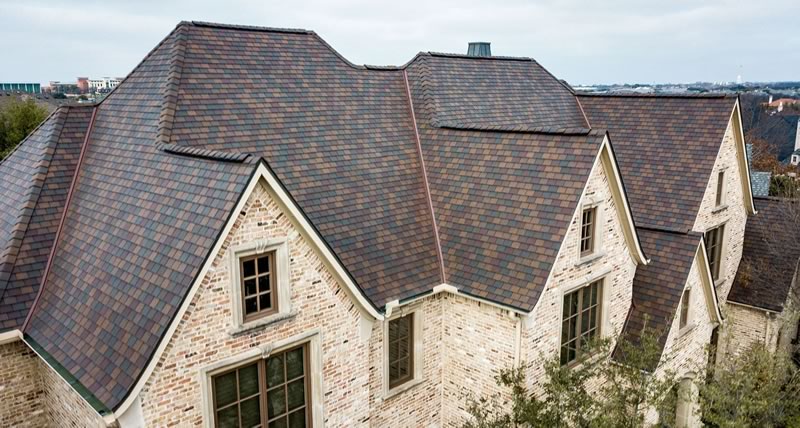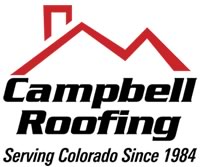The first thing you should do after a hail storm is to determine if you have a need for an emergency repair.
Do you have a broken skylight or window? These need to be addressed ASAP to minimize any potential water damage to your home.
The next step, is to contact a contractor to assess damages. The contractor can advise if the damages are severe enough to warrant a claim. The contractor should be able to provide a detailed assessment of all items that need to be fixed, and can work with your insurance adjuster to verify the loss.
Hail damage to your roof will look like black circular marks.
Hail damage can vary in severity based on the size of the hail, its density, and the speed in which it fell.
The reason hail damage is a problem is that the asphalt layer of your shingles is protected by granules which have UV protectant qualities. Once the granules are crushed, it exposes the asphalt to the sun which causes the asphalt to break down – resulting in leaks over time.
You should call your licensed contractor if you suspect that your roof is leaking.
If you notice an active leak – around a skylight, or evidence of drywall or paint bubbles – look for an active way to collect or sop up the water. Water is extremely damaging. If you see a large active/wet stain on your ceiling, or see the paint begin to bubble – poke a small hole in the drywall to let the water flow. This will help mitigate additional water damage.
The best roof for hail in Colorado is the a Class 4 Shingle Roof.
Campbell Roofing offers several manufacturers of Class 4 Shingles, such as GAF, Malarkey, and Owens Corning. Many insurance carriers offer discounts for Class 4 roofs due to the extensive testing and performance these roofs offer.
A Class 4 Roof will in many cases provide you, the homeowner with a premium discount on your insurance policy. Insurance carriers give discounts on this product because it has undergone lab testing that proves that it will not fail when damaged by 2” hail.
The testing comes in two forms.
- 2” steel ball dropped on the product
- 2” ice ball shot from a ice cannon.
If the tested product can sustain impact from either of these tests, it is awarded the Class 4 designation. Class 4 is not a warranty. It is simply stating that the product will not fail with 2” impact. Larger hail has destroyed the Class 4 shingle in our market, and those may need to be replaced if the hail is sizeable enough.
Campbell Roofing, Inc offers a 3-year workmanship warranty. This warranty covers any issues with our installation and the collateral repairs that may result. In addition to our workmanship warranty, the manufacturers each offer their own separate warranty against product defect. These generally are 10 years non-prorated and extend out to 50 years in a pro-rated fashion. Shingle manufacturers give this type of warranty a “lifetime” designation.
Our elite status with GAF allows us to offer a Silver and Golden Pledge warranty which extends the workmanship coverage to 10 or 25 years respectively, has a 15 year no maximum wind speed warranty and has a 50 year non-prorated coverage against manufacturer defects.
The Silver and Golden Pledge are offered as an upgrade option.
You should ask yourself three questions when selecting a roofing contractor in Colorado.
- Do I know someone who has used this contractor in the past?
- Does the contractor have a preferred status with my insurance company?
- How long has the contractor been in business?
Insurance will cover roof repairs and replacements less your insurance deductible. In some cases, the repair cost may be below your deductible in which case you would be responsible for the entire expense. The insurance adjuster is looking at the damages and evaluating them against your coverage. If the damages are covered in your policy, the insurance carrier is required to pay to bring your home back to pre-loss condition.
Please make sure you review your policy and know key terms regarding coverage.
- ACV – Actual Cash Value: This policy type includes depreciation based on age, and the claim amount you receive is reduced by the age of the roof. In addition, the deductible still applies, and your claim payment is reduced by depreciation and your deductible.
- RCV – Replacement Cash Value – this type of policy is a “like for like” replacement of your roof in today’s dollars. Deductible applies, but you will receive the withheld depreciation once the work is completed.
We will work with your insurance company. What does that look like? Typically, it means that we will meet your insurance adjuster and discuss the scope with them. It can also mean that we address any items that were missed or omitted from your claim. Should items be identified during the construction process that were missed during the initial inspection, those items can also be addressed with your insurance company.
We are a preferred contractor with many of the largest insurance companies. This means that we follow specific protocols and adhere to the highest industry standards. We helped pioneer a direct repair program with the largest military insurance carrier almost 20 years ago. This program is like what you would find with an insurance auto repair shop, but specifically for property claims. The direct repair program has now grown to over 5,000 contractors across the United States. Program guidelines provide for outside quality audits, insurance coverage standards and a review of our financials on a yearly basis.
To file a claim, you simply need to call your insurance agent or insurance company. Advise them of the type of damages you have identified and let them know the date of loss (when the damage occurred).
State law prohibits any roofing contractor from covering deductibles. The premiums you pay monthly are based on the deductible and policy coverage you have selected. This law puts all contractors on the same level. You can evaluate the company independently of the price since you are still only responsible to pay your part/deductible and any upgrades you may select.
When you are buying a home, the roof should be inspected to identify any potential issues that may exist. Your home inspector should inspect the roof as a part of the overall condition of the home. The inspection may identify minor issues such as maintenance items that should be addressed. In some cases, larger issues may be found that would necessitate a roof replacement.
Many realtors are advising sellers to have an inspection done prior to listing the home. This allows the sellers to address items that may come up during the buyer’s home inspection. It is a good idea to go into the listing of your home with as much information as possible.
Campbell Roofing offers a free inspection, so there is really no reason not to have an inspection done.

